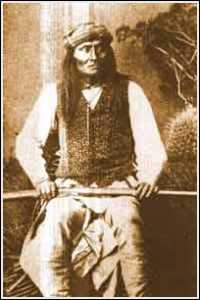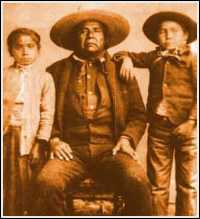FRtR > Biographies >
Geronimo > His own story - Chapter 12
Geronimo
His own story
Coming of the White Men
< Previous Chapter *
Next Chapter >
*** Quote ***
About the time of the massacre of "Kaskiyeh"
(1858) we heard that some white men were
measuring land to the south of us. In company
with a number of other warriors I went to visit
them. We could not understand them very well,
for we had no interpreter, but we made a treaty
with them by shaking hands and promising to be
brothers. Then we made our camp near their
camp, and they came to trade with us. We gave
them buckskin, blankets, and ponies in exchange
for shirts and provisions. We also brought them
game, for which they gave us some money. We
did not know the value of this money, but we
kept it and later learned from the Navajo Indians
that it was very valuable.
Every day they measured land with curious
instruments and put down marks which we could
not understand. They were good men, and we
were sorry when they had gone on into the west.
They were not soldiers. These were the first
white men I ever saw.
About ten years later some more white men
came. These were all warriors. They made their
camp on the Gila River south of Hot Springs. At
first they were friendly and we did not dislike
them, but they were not as good as those who
came first.
After about a year some trouble arose between
them and the Indians, and I took the war path
as a warrior, not as a chief. I had not been
wronged, but some of my people bad been, and I
fought with my tribe; for the soldiers and not
the Indians were at fault.
 Not long after this some of the officers of the
United States troops invited our leaders to hold
a conference at Apache Pass (Fort Bowie). Just
before noon the Indians were shown into a tent
and told that they would be given something to
eat. When in the tent they were attacked by soldiers.
our chief, Mangus-Colorado, and several
other warriors, by cutting through the tent,
escaped; but most of the warriors were killed or
captured. Among the Bedonkohe Apaches killed
at this time were Sanza, Kladetahe, Niyokahe,
and Gopi. After this treachery the Indians went
back to the mountains and left the fort entirely
alone. I do not think that the agent had anything
to do with planning this, for he had always treated
us well. I believe it was entirely planned by
the soldiers.
Not long after this some of the officers of the
United States troops invited our leaders to hold
a conference at Apache Pass (Fort Bowie). Just
before noon the Indians were shown into a tent
and told that they would be given something to
eat. When in the tent they were attacked by soldiers.
our chief, Mangus-Colorado, and several
other warriors, by cutting through the tent,
escaped; but most of the warriors were killed or
captured. Among the Bedonkohe Apaches killed
at this time were Sanza, Kladetahe, Niyokahe,
and Gopi. After this treachery the Indians went
back to the mountains and left the fort entirely
alone. I do not think that the agent had anything
to do with planning this, for he had always treated
us well. I believe it was entirely planned by
the soldiers.
From the very first the soldiers sent out to our
western country, and the officers in charge of
them, did not hesitate to wrong the Indians.
They never explained to the Government when
an Indian was wronged, but always reported the
misdeeds of the Indians. Much that was done by
mean white men was reported at Washington as
the deeds of my people.
 The Indians always tried to live peaceably
with the white soldiers and settlers. One day during
the time that the soldiers were stationed at
Apache Pass I made a treaty with the post. This
was done by shaking hands and promising to be
brothers. Cochise and Mangus-Colorado did likewise.
I do not know the name of the officer in
command, but this was the first regiment that
ever came to Apache Pass. This treaty was made
about a year before we were attacked in a tent,
as above related. In a few days after the attack at
Apache Pass we organized in the mountains and
returned to fight the soldiers. There were two
tribes-the Bedonkohe and the Chokonen
Apaches, both commanded by Cochise. After a
few days' skirmishing we attacked a freight train
that was coming in with supplies for the Fort.
We killed some of the men and captured the
others. These prisoners our chief offered to trade
for the Indians whom the soldiers had captured at
the massacre in the tent. This the officers refused,
so we killed our prisoners, disbanded, and went
into hiding in the mountains. Of those who took
part in this affair I am the only one now living.
The Indians always tried to live peaceably
with the white soldiers and settlers. One day during
the time that the soldiers were stationed at
Apache Pass I made a treaty with the post. This
was done by shaking hands and promising to be
brothers. Cochise and Mangus-Colorado did likewise.
I do not know the name of the officer in
command, but this was the first regiment that
ever came to Apache Pass. This treaty was made
about a year before we were attacked in a tent,
as above related. In a few days after the attack at
Apache Pass we organized in the mountains and
returned to fight the soldiers. There were two
tribes-the Bedonkohe and the Chokonen
Apaches, both commanded by Cochise. After a
few days' skirmishing we attacked a freight train
that was coming in with supplies for the Fort.
We killed some of the men and captured the
others. These prisoners our chief offered to trade
for the Indians whom the soldiers had captured at
the massacre in the tent. This the officers refused,
so we killed our prisoners, disbanded, and went
into hiding in the mountains. Of those who took
part in this affair I am the only one now living.
In a few days troops were sent out to search
for us, but as we were disbanded, it was, of
course, impossible for them to locate any hostile
camp. During the time they were searching for
us many of our warriors (who were thought by
the soldiers to be peaceable Indians) talked to
the officers and men, advising them where they
might find the camp they sought, and while they
searched we watched them from our hiding
places and laughed at their failures.
After this trouble all of the Indians agreed not
to be friendly with the white men any more.
There was no general engagement, but a long
struggle followed. Sometimes we attacked the
white men, sometimes they attacked us. First a
few Indians would be killed and then a few soldiers.
I think the killing was about equal on each
side. The number killed in these troubles did not
amount to much, but this treachery on the part
of the soldiers had angered the Indians and revived
memories of other wrongs, so that we
never again trusted the United States troops.
< Previous Chapter *
Next Chapter >
 Not long after this some of the officers of the
United States troops invited our leaders to hold
a conference at Apache Pass (Fort Bowie). Just
before noon the Indians were shown into a tent
and told that they would be given something to
eat. When in the tent they were attacked by soldiers.
our chief, Mangus-Colorado, and several
other warriors, by cutting through the tent,
escaped; but most of the warriors were killed or
captured. Among the Bedonkohe Apaches killed
at this time were Sanza, Kladetahe, Niyokahe,
and Gopi. After this treachery the Indians went
back to the mountains and left the fort entirely
alone. I do not think that the agent had anything
to do with planning this, for he had always treated
us well. I believe it was entirely planned by
the soldiers.
Not long after this some of the officers of the
United States troops invited our leaders to hold
a conference at Apache Pass (Fort Bowie). Just
before noon the Indians were shown into a tent
and told that they would be given something to
eat. When in the tent they were attacked by soldiers.
our chief, Mangus-Colorado, and several
other warriors, by cutting through the tent,
escaped; but most of the warriors were killed or
captured. Among the Bedonkohe Apaches killed
at this time were Sanza, Kladetahe, Niyokahe,
and Gopi. After this treachery the Indians went
back to the mountains and left the fort entirely
alone. I do not think that the agent had anything
to do with planning this, for he had always treated
us well. I believe it was entirely planned by
the soldiers. The Indians always tried to live peaceably
with the white soldiers and settlers. One day during
the time that the soldiers were stationed at
Apache Pass I made a treaty with the post. This
was done by shaking hands and promising to be
brothers. Cochise and Mangus-Colorado did likewise.
I do not know the name of the officer in
command, but this was the first regiment that
ever came to Apache Pass. This treaty was made
about a year before we were attacked in a tent,
as above related. In a few days after the attack at
Apache Pass we organized in the mountains and
returned to fight the soldiers. There were two
tribes-the Bedonkohe and the Chokonen
Apaches, both commanded by Cochise. After a
few days' skirmishing we attacked a freight train
that was coming in with supplies for the Fort.
We killed some of the men and captured the
others. These prisoners our chief offered to trade
for the Indians whom the soldiers had captured at
the massacre in the tent. This the officers refused,
so we killed our prisoners, disbanded, and went
into hiding in the mountains. Of those who took
part in this affair I am the only one now living.
The Indians always tried to live peaceably
with the white soldiers and settlers. One day during
the time that the soldiers were stationed at
Apache Pass I made a treaty with the post. This
was done by shaking hands and promising to be
brothers. Cochise and Mangus-Colorado did likewise.
I do not know the name of the officer in
command, but this was the first regiment that
ever came to Apache Pass. This treaty was made
about a year before we were attacked in a tent,
as above related. In a few days after the attack at
Apache Pass we organized in the mountains and
returned to fight the soldiers. There were two
tribes-the Bedonkohe and the Chokonen
Apaches, both commanded by Cochise. After a
few days' skirmishing we attacked a freight train
that was coming in with supplies for the Fort.
We killed some of the men and captured the
others. These prisoners our chief offered to trade
for the Indians whom the soldiers had captured at
the massacre in the tent. This the officers refused,
so we killed our prisoners, disbanded, and went
into hiding in the mountains. Of those who took
part in this affair I am the only one now living.